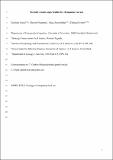Necessity creates opportunities for chimpanzee tool use
Abstract
Although social transmission mechanisms of animal cultures are well studied, little is known about the origins of behavioral innovations, even in established tool users such as chimpanzees. Previous work has suggested that wild chimpanzees are especially prone to engaging with tools during extended periods of low food availability and after long travel, supporting the hypothesis that cultural innovation is facilitated by necessity revealing opportunities. Here, we tested this hypothesis with a field experiment that directly compared subjects' immediate variation in measures of current energy balance with their interest in a novel foraging problem, liquid honey enclosed in an apparatus accessible by tool use. We found that the previous distance traveled directly predicted subjects' manipulations of both the apparatus and the tool, whereas previous feeding time was negatively correlated to manipulation time. We conclude that "necessity" augments chimpanzees' likelihood of engaging with ecological "opportunities," suggesting that both factors are scaffolding foraging innovation in this and potentially other species.
Citation
Grund , C , Neumann , C , Zuberbuehler , K & Gruber , T 2019 , ' Necessity creates opportunities for chimpanzee tool use ' , Behavioral Ecology , vol. 30 , no. 4 , pp. 1136-1144 . https://doi.org/10.1093/beheco/arz062
Publication
Behavioral Ecology
Status
Peer reviewed
ISSN
1045-2249Type
Journal article
Description
This work was funded by the European Research Council (FP7/2007–2013 / ERC grant number n° 283871) and the Swiss National Science Foundation (grant numbers 310030_143359 to K.Z.; CR13I1_162720, P300PA_164678 to T.G.).Collections
Items in the St Andrews Research Repository are protected by copyright, with all rights reserved, unless otherwise indicated.

